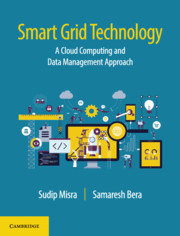Foreword
Published online by Cambridge University Press: 20 October 2018
Summary
The growing concern about climate change and energy conservation necessitates the existing power grid to be modernized. Consequently, bi-directional communication network is placed atop the existing power grid, named as smart grid, with an aim to reduce energy loss and to provide improved energy management. This makes smart grid a cyber-physical system with a strong intertwining between the software, communication, control, and physical components. The cyber-physical property of smart grid necessitates adequate energy and information management, while considering the associated security concerns. Further, millions of smart meters are expected to be deployed to collect real-time status of energy consumption, and the collected information should be processed in real-time. Consequently, smart grid requires support of advanced computing platform and data management tools to manage real-time energy requirements and to process real-time information, respectively. Cloud computing and big data technologies are the topics of interest among the scientific community due to their inherent features of advanced computation and data management.
Unlike most smart grid books, Sudip Misra and Samaresh Bera in this book focus on the specific challenges that are presented in the smart grid while integrating multiple entities together, which can be potentially solved using cloud computing technology and advanced data management approaches. It covers main aspects of smart grid, touching energy management, information management, and security, by leveraging the advantages of cloud computing technology and advanced data management approaches. The book discusses the important issues, such as demand response, dynamic pricing, load balancing, and smart meter data management, and includes the treatment to deal with such issues. In brief, the attractive features of this book are catalogued below:
a) Fundamental concepts of smart grid, cloud computing, and big data analytics are discussed. Additionally, the commonly used mathematical models and tools in this domain are also given concisely.
b) Cloud computing technology for smart grid presents a comprehensive discussion on the benefits of cloud computing technology in the smart grid for improved energy management and security.
c) Data management approaches mainly focus on the information management in the smart grid.
d) Smart grid simulation tools and initiatives worldwide highlight the recent efforts and on-going projects to realize the smart grid technology in a large-scale.
- Type
- Chapter
- Information
- Smart Grid TechnologyA Cloud Computing and Data Management Approach, pp. xxi - xxivPublisher: Cambridge University PressPrint publication year: 2018



